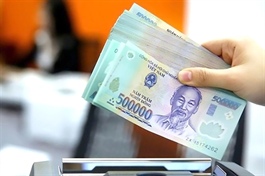Assessing the switch in bond issuances
Assessing the switch in bond issuances
The Vietnamese government earlier this month officially promulgated Decree No.08/2023/ND-CP dated March 5 on amending, supplementing, and suspending articles of Decree No.65/2022/ND-CP from last September on offering and transacting corporate bonds in the domestic market and offering corporate bonds to international markets.

Particularly, there are some significant modifications relating to bond repayment, which are expected to address some current challenges of the debt market.
For bonds issued in the domestic market, the issuing enterprise, or bond issuer, is now permitted to negotiate with bondholders to repay the principal amounts and interests with other assets in the event that such bond issuers are unable to pay the principal amounts and interests when it becomes due. The bond swap negotiation will be conducted with approval of bondholders and adhere to the relevant laws.
Bond terms can now be extended by a maximum period of two years from the original term of the existing bonds if it is approved by the authorised body of the issuing enterprise; and if it is approved by the bondholders holding 65 per cent or more of the total number of circulating bonds of the same class. If the bondholders do not agree with the amendments to the bond’s terms and conditions, the bond issuers must negotiate with the objective of preserving the interests of the bondholders. If the negotiation fails, and if the bondholders refuse to negotiate, the bond issuers must comply with their obligations in accordance with the terms and conditions of the existing bonds.
With consideration given to the current state of the bond and real estate markets, it can be ascertained that the government’s promulgation of Decree 08 should be treated as a sign of assisting real estate companies and corporations that are unable to repay the bonds when they become due, as well as the individuals and corporations that have bought real estate bonds.
However, the practicality of the solution provided through Decree 08 must be considered. First and foremost, related parties should consider legal risks associated with using real estate as bond repayment (especially off-plan real estate). Typically, the real estate of the bonds issued can already be used as collateral; or has been real estate in an off-plan housing project that has been mortgaged to raise capital for construction.
As such, permission is required from the mortgagees before any transaction involving the said real estate can be conducted, and other assets must be provided as replacement. If the said real estate involves off-plan, complications may arise as interest from multiple parties can be affected, such as the bond issuers, the mortgagee, and the bondholders. In addition, the repayment using off-plan real estate must comply with many laws and regulations.
In practice, many real estate projects from bond issuers cannot satisfy such requirements. In addition, bondholders mostly consist of banks and financial institutions. Article 132 of the Law on Credit Institutions notes that institutions defined to include banks and financial corporations must not engage in real estate. Exceptions include possessing real estate as a result of debt settlement.
Comparing the said article and Decree 08, the following issues must be considered: whether the repayment of bonds by real estate can be considered as possessing real estate in accordance with the exception to Article 132; and if financial institutions accept payment of bonds by real estate, the time period associated with the sale of the real estate must be considered.
If the institutions do not or are unable to sell real estate received as repayment for bond in a reasonable timeframe, the authorities may consider the mentioned activities as engaging in real estate business, especially if such assets are sold for a considerable amount of profit.
Secondly, both bond issuers and bondholders should thoroughly evaluate difficulties associated with valuating real estate as bond repayment. The evaluation of real estate is another important issue when bondholders are given the right to receive real estate as bond repayment.
Ordinarily, the bondholders must consider the feasibility of accepting real estate as bond repayment through two steps. The first step includes collecting necessary information to evaluate the asset at the time of negotiation and acceptance, with consideration given to the project completion and hand over probability for future real estate. The second step includes deliberating on the acceptance of repayment of bonds by real estate.
For bondholders who are individual investors, valuation of real estate and off-plan real estate is a complicated process and insufficient information often prevents individuals from accepting repayment of bonds by real estate. As such, bond issuers should not expect significant enthusiasm from individual investors.
In contrast, while banks and financial institutions should not encounter many issues with the first step, with the current state of the real estate and bond market, issuers should face difficulties obtaining acceptance from banks and institutions as the project completion and hand-over probability is relatively low (in turn reducing the value of the real estate significantly), which is the result of hindrance in real estate companies’ cash flow resulting in the inability to repay bonds in the first place.
Even if acceptance from banks and institutions can be obtained, it is highly likely that they will require a considerable amount of real estate as repayment to compensate for the low value of the said real estate.
Furthermore, the inability to repay bonds is a sign of lack of liquidity. Hence, the probability of completing real estate projects which involve future real estate used as bond repayment is questionable. Moreover, bond issuers must continue their payment obligations to the bondholders refusing to accept this arrangement, which further affects the probability of completing real estate projects and in turn affects the interest of bondholders accepting this arrangement.



















